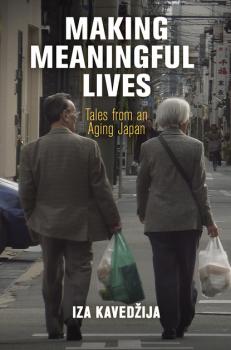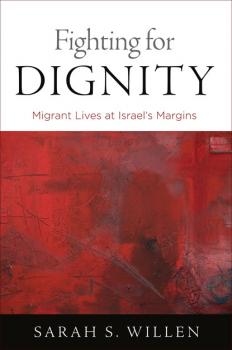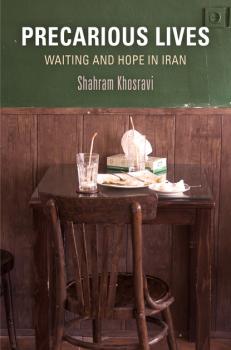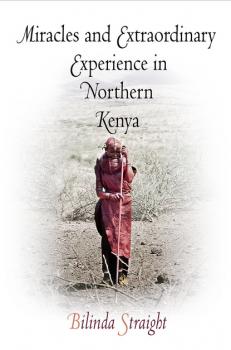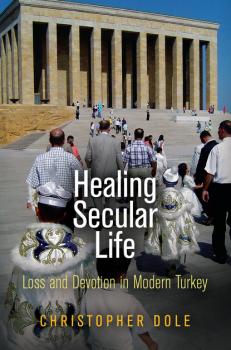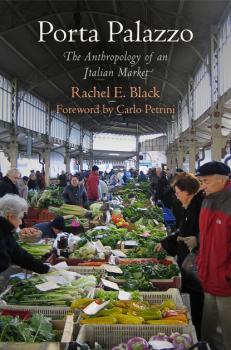Contemporary Ethnography
Скачать книги из серии Contemporary EthnographyMaking Meaningful Lives
What makes for a meaningful life? In the Japanese context, the concept of ikigai provides a clue. Translated as «that which makes one's life worth living,» ikigai has also come to mean that which gives a person happiness. In Japan, where the demographic cohort of elderly citizens is growing, and new modes of living and relationships are revising traditional multigenerational family structures, the elderly experience of ikigai is considered a public health concern. Without a relevant model for meaningful and joyful older age, the increasing older population of Japan must create new cultural forms that center the ikigai that comes from old age. In Making Meaningful Lives , Iza Kavedžija provides a rich anthropological account of the lives and concerns of older Japanese women and men. Grounded in years of ethnographic fieldwork at two community centers in Osaka, Kavedžija offers an intimate narrative analysis of the existential concerns of her active, independent subjects. Alone and in groups, the elderly residents of these communities make sense of their lives and shifting ikigai with humor, conversation, and storytelling. They are as much providers as recipients of care, challenging common images of the elderly as frail and dependent, while illustrating a more complex argument: maintaining independence nevertheless requires cultivating multiple dependences on others. Making Meaningful Lives argues that an anthropology of the elderly is uniquely suited to examine the competing values of dependence and independence, sociality and isolation, intimacy and freedom, that people must balance throughout all of life's stages.
Fighting for Dignity
In Fighting for Dignity , Sarah S. Willen explores what happened when the Israeli government launched an aggressive deportation campaign targeting newly arrived migrants from countries as varied as Ghana and the Philippines, Nigeria, Colombia, and Ukraine. Although the campaign was billed as a solution to high unemployment, it had another goal as well: to promote an exclusionary vision of Israel as a Jewish state in which non-Jews have no place. The deportation campaign quickly devastated Tel Aviv's migrant communities and set the stage for even more aggressive antimigrant and antirefugee policies in the years to come. Fighting for Dignity traces the roots of this deportation campaign in Israeli history and the Israeli-Palestinian conflict and shows how policies that illegalize and criminalize migrants wreak havoc in their lives, endanger their health, and curtail the human capacity to flourish. Children born to migrant parents are especially vulnerable to developmental and psychosocial risks. Drawing on nearly two decades of ethnographic engagement in homes and in churches, medical offices, advocacy organizations, and public spaces, Willen shows how migrants struggle to craft meaningful, flourishing lives despite the exclusions and vulnerabilities they endure. To complement their perspectives, she introduces Israeli activists who reject their government's exclusionary agenda and strive to build bridges across difference, repair violations of migrants' dignity, and resist policies that violate their own moral convictions. Willen's vivid and unflinching ethnography challenges us to reconsider our understandings of global migration, human rights, the Middle East— and even dignity itself.
In Chocolate We Trust
In Chocolate We Trust takes readers inside modern-day Hershey, Pennsylvania, headquarters of the iconic Hershey brand. A destination for chocolate enthusiasts since the early 1900s, Hershey has transformed from a model industrial town into a multifaceted suburbia powered by philanthropy. At its heart lies the Milton Hershey School Trust, a charitable trust with a mandate to serve «social orphans» and a $12 billion endowment amassed from Hershey Company profits. The trust is a longstanding source of pride for people who call Hershey home and revere its benevolent capitalist founder—but in recent years it has become a subject of controversy and intrigue. Using interviews, participant observation, and archival research, anthropologist Peter Kurie returns to his hometown to examine the legacy of the Hershey Trust among local residents, company employees, and alumni of the K-12 Milton Hershey School. He arrives just as a scandal erupts that raises questions about the outsized power of the private trust over public life. Kurie draws on diverse voices across the community to show how philanthropy stirs passions and interests well beyond intended beneficiaries. In Chocolate We Trust reveals the cultural significance of Hershey as a forerunner to socially conscious corporations and the cult of the entrepreneur-philanthropist. The Hershey story encapsulates the dreams and wishes of today's consumer-citizens: the dream of becoming personally successful, and the wish that the most affluent among us will serve the common good.
Precarious Lives
In Precarious Lives , Shahram Khosravi attempts to reconcile the paradoxes of Iranians' everyday life in the first decade of the twenty-first century. On the one hand, multiple circumstances of precarity give rise to a sense of hopelessness, shared visions of a futureless tomorrow, widespread home(land)lessness, intense individualism, and a growth of incivilities. On the other, daydreaming and hope, as well as civility and solidarity in political protests, street carnivals, and social movements, continue to persist. Young Iranians describe themselves as being stuck in purposelessness and forced to endure endless waiting, and they are also aware that they are perceived as unproductive and a burden on their society. Despite the aspirations and inspiration they possess, they find themselves forced into petrifying social and spatial immobility. Uncertainty in the present, a seemingly futureless tomorrow: these are the circumstances that Khosravi explores in Precarious Lives . Creating an intricate and moving portrait of contemporary Iranian life, Khosravi weaves together individual stories, government reports, statistics, and cultural analysis of art and literature to depict how Iranians react to the experience of precarity and the possibility of hope. Drawing on extensive ethnographic engagement with youth in Tehran and Isfahan as well as with migrant workers in rural areas, Khosravi examines the complexities and contradictions of everyday life in Iran. Precarious Lives is a vital work of contemporary anthropology that serves as a testament to the shared hardship and hope of the Iranian people.
Daughters of Parvati
In her role as devoted wife, the Hindu goddess Parvati is the divine embodiment of viraha , the agony of separation from one's beloved, a form of love that is also intense suffering. These contradictory emotions reflect the overlapping dissolutions of love, family, and mental health explored by Sarah Pinto in this visceral ethnography. Daughters of Parvati centers on the lives of women in different settings of psychiatric care in northern India, particularly the contrasting environments of a private mental health clinic and a wing of a government hospital. Through an anthropological consideration of modern medicine in a nonwestern setting, Pinto challenges the dominant framework for addressing crises such as long-term involuntary commitment, poor treatment in homes, scarcity of licensed practitioners, heavy use of pharmaceuticals, and the ways psychiatry may reproduce constraining social conditions. Inflected by the author's own experience of separation and single motherhood during her fieldwork, Daughters of Parvati urges us to think about the ways women bear the consequences of the vulnerabilities of love and family in their minds, bodies, and social worlds.
Miracles and Extraordinary Experience in Northern Kenya
The Samburu of northern Kenya struggle to maintain their pastoral way of life as drought and the side effects of globalization threaten both their livestock and their livelihood. Mirroring this divide between survival and ruin are the lines between the self and the other, the living and the dead, «this side» and inia bata , «that side.» Cultural anthropologist Bilinda Straight, who has lived with the Samburu for extended periods since the 1990s, bears witness to Samburu life and death in Miracles and Extraordinary Experience in Northern Kenya . Written mostly in the field, Miracles and Extraordinary Experience in Northern Kenya is the first book-length ethnography completely devoted to Samburu divinity and belief. Here, child prophets recount their travels to heaven and back. Others report transformations between persons and inanimate objects. Spirit turns into action and back again. The miraculous is interwoven with the mundane as the Samburu continue their day-to-day twenty-first-century existence. Straight describes these fantastic movements inside the cultural logic that makes them possible; thus she calls into question how we experience, how we feel, and how anthropologists and their readers can best engage with the improbable. In her detailed and precise accounts, Straight writes beyond traditional ethnography, exploring the limits of science and her own limits as a human being, to convey the significance of her time with the Samburu as they recount their fantastic yet authentic experiences in the physical and metaphysical spaces of their culture.
Matching Organs with Donors
While the traffic in human organs stirs outrage and condemnation, donations of such material are perceived as highly ethical. In reality, the line between illicit trafficking and admirable donation is not so sharply drawn. Those entangled in the legal, social, and commercial dimensions of transplanting organs must reconcile motives, bureaucracy, and medical desperation. Matching Organs with Donors: Legality and Kinship in Transplants examines the tensions between law and practice in the world of organ transplants—and the inventive routes patients may take around the law while going through legal processes. In this sensitive ethnography, Marie-Andrée Jacob reveals the methods and mindsets of doctors, administrators, gray-sector workers, patients, donors, and sellers in Israel's living kidney transplant bureaus. Matching Organs with Donors describes how suitable matches are identified between donor and recipient using terms borrowed from definitions of kinship. Jacob presents a subtle portrait of the shifting relationships between organ donors/sellers, patients, their brokers, and hospital officials who often accept questionably obtained organs. Jacob's incisive look at the cultural landscapes of transplantation in Israel has wider implications. Matching Organs with Donors deepens our understanding of the law and management of informed consent, decision-making among hospital professionals, and the shadowy borders between altruism and commerce.
Healing Secular Life
In contemporary Turkey—a democratic, secular, and predominantly Muslim nation—the religious healer is a controversial figure. Attracting widespread condemnation, religious healers are derided as exploiters of the sick and vulnerable, discredited forms of Islamic and medical authority, and superstitious relics of a pre-modern era. Yet all sorts of people, and not just the desperately ill, continue to seek them out. After years of research with healers and their patients in working-class neighborhoods of urban Turkey, anthropologist Christopher Dole concludes that the religious healer should be regarded not as an exception to Turkey's secular modern development but as one of its defining figures. Healing Secular Life demonstrates that religious healing and secularism in fact have a set of common stakes in the ordering of lives and the remaking of worlds. Linking the history of medical reforms and scientific literacy campaigns to contemporary efforts of Qur'anic healers to treat people afflicted by spirits and living saints through whom deceased political leaders speak, Healing Secular Life approaches stories of healing and being healed as settings for examining the everyday social intimacies of secular political rule. This ethnography of loss, care, and politics reveals not only that the authority of the religious healer is deeply embedded within the history of secular modern reform in Turkey but also that personal narratives of suffering and affliction are inseparable from the story of a nation seeking to recover from the violence of its own secular past.
Porta Palazzo
Porta Palazzo, arguably Western Europe's largest open-air market, is a central economic, social, and cultural hub for Italians and migrants in the city of Turin. Open-air markets like Porta Palazzo have existed for centuries in Europe; although their function has changed over time—traditional markets are no longer the primary place to buy food—they remain popular destinations. In an age of supermarkets and online commerce, markets offer unique social and cultural opportunities and bring together urban and rural worldviews. These factors are often overlooked in traditional economic studies of food distribution, but anthropologist Rachel E. Black contends that social relations are essential for building and maintaining valuable links between production and consumption. From the history of Porta Palazzo to the current growing pains of the market, this book concentrates on points where trade meets cultural identities and cuisine. Its detailed and perceptive portraits of the market bring into relief the lives of the vendors, shoppers, and passersby. Black's ethnography illuminates the daily work of market-going and the anxieties of shoppers as they navigate the market. It examines migration, the link between cuisine and cultural identity, culinary tourism, the connection between the farmers' market and the production of local food, and the urban planning issues negotiated by the city of Turin and market users during a recent renovation. This vibrant study, featuring a foreword by Slow Food Movement founder Carlo Petrini, makes a strong case for why markets like Porta Palazzo are critical for fostering culinary culture and social life in cities.
Body and Emotion
Body and Emotion is a study of the relationship between culture and emotional distress, an examination of the cultural forces that influence, make sense of, and heal severe pain and malaise. In order to investigate this relationship, Robert R. Desjarlais served as an apprentice healer among the Yolmo Sherpa, a Tibetan Buddhist people who reside in the Helambu region of north-central Nepal.
